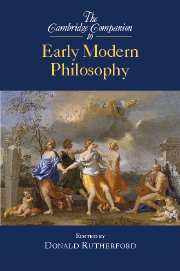Book contents
- Frontmatter
- Introduction
- 1 Innovation and orthodoxy in early modern philosophy
- 2 Knowledge, evidence, and method
- 3 From natural philosophy to natural science
- 4 Metaphysics
- 5 The science of mind
- 6 Language and logic
- 7 The passions and the good life
- 8 The foundations of morality: virtue, law, and obligation
- 9 Theories of the state
- 10 Theology and the God of the philosophers
- 11 Scholastic schools and early modern philosophy
- 12 Toward enlightenment: Kant and the sources of darkness
- Short biographies of major early modern philosophers
- Bibliography
- Index
- Series list
4 - Metaphysics
Published online by Cambridge University Press: 28 January 2007
- Frontmatter
- Introduction
- 1 Innovation and orthodoxy in early modern philosophy
- 2 Knowledge, evidence, and method
- 3 From natural philosophy to natural science
- 4 Metaphysics
- 5 The science of mind
- 6 Language and logic
- 7 The passions and the good life
- 8 The foundations of morality: virtue, law, and obligation
- 9 Theories of the state
- 10 Theology and the God of the philosophers
- 11 Scholastic schools and early modern philosophy
- 12 Toward enlightenment: Kant and the sources of darkness
- Short biographies of major early modern philosophers
- Bibliography
- Index
- Series list
Summary
According to the Gospels, men do not put new wine in old bottles. Metaphorically speaking at least, philosophers of the early modern period tend to be exceptions to this rule. Descartes and his successors inherited a rich metaphysical vocabulary and set of categories from the ancient and medieval world; particularly in the work of Aristotle and his scholastic disciples, this conceptual framework had been devised to articulate a metaphysical picture of the universe very different from any which was likely to commend itself to philosophers in the age of the Scientific Revolution. Nonetheless, instead of rejecting this inherited framework wholesale, philosophers of the period tend to retain it in large measure while infusing it with radically new content. Such content was of course adapted to the task of providing metaphysical foundations for the new scientific world picture. And in the case of many philosophers it was also adapted to the goal of providing new bases for doctrines of traditional natural theology such as the immortality of the soul.
The contrast between the new wine and the old bottles may help to throw light on one difficulty posed by metaphysics of the early modern period. Readers approaching the metaphysical systems for the first time are struck by the fact that philosophers often seem to be announcing “news from nowhere”; the great metaphysical systems tend to be full of strange and extravagant claims, typified by Spinoza’s insistence that there is only one substance, Malebranche’s insistence that there is only one cause, and Leibniz’s insistence that no created substances causally interact with one another.
- Type
- Chapter
- Information
- The Cambridge Companion to Early Modern Philosophy , pp. 95 - 135Publisher: Cambridge University PressPrint publication year: 2006
- 2
- Cited by



